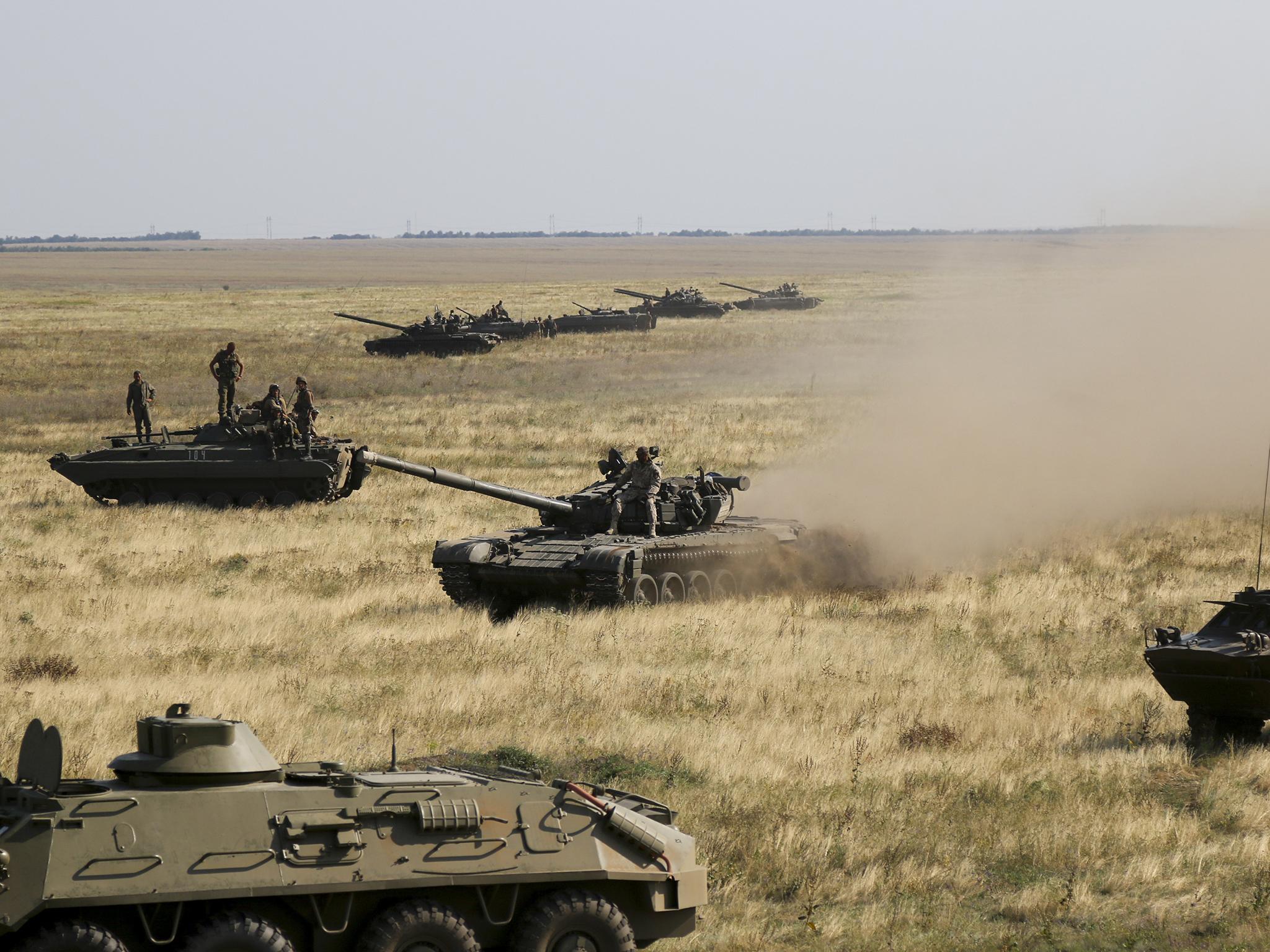Russia is teetering on the brink of ‘all out war’ with Ukraine
Whether tensions escalate or subside will depend most upon the political calculus of Russia. Previously, Moscow had hoped that sustained economic, military and political pressure could lead to significant loss of support within Ukraine for its pro-Western government

Your support helps us to tell the story
From reproductive rights to climate change to Big Tech, The Independent is on the ground when the story is developing. Whether it's investigating the financials of Elon Musk's pro-Trump PAC or producing our latest documentary, 'The A Word', which shines a light on the American women fighting for reproductive rights, we know how important it is to parse out the facts from the messaging.
At such a critical moment in US history, we need reporters on the ground. Your donation allows us to keep sending journalists to speak to both sides of the story.
The Independent is trusted by Americans across the entire political spectrum. And unlike many other quality news outlets, we choose not to lock Americans out of our reporting and analysis with paywalls. We believe quality journalism should be available to everyone, paid for by those who can afford it.
Your support makes all the difference.Ukraine is holding a major military parade in Kiev today to mark its 25th anniversary as an independent state. But, at a time that should otherwise be a moment of national celebration, a serious crisis with Moscow is flaring up. So serious, in fact, that on Tuesday the Russian President Vladimir Putin, German Chancellor Angela Merkel and French President Francois Hollande were forced to hold a three-way phone call to try to de-escalate the situation.
Ukrainian President Petro Poroshenko has even warned that there is growing risk of a “full scale Russian invasion along all fronts,” ratcheting up what is already the bloodiest European conflict since the wars over the former Yugoslavia in the 1990s.
The uptick in tensions coincides with a visit last Friday by Putin to Crimea, which was annexed by Moscow in 2014. Russia’s assertion last week that Kiev attempted an armed incursion into Crimea, plus the death of three Ukrainian soldiers, has escalated the situation further.
In total, the 28-month crisis between the two countries has claimed an estimated 9,500 lives and more than a million people have fled their homes. The Ukrainian economy is in the doldrums, with foreign exchange reserves depleted and the government seeking to rejuvenate a $17.5bn (£13bn) Western-led economic bailout deal.
With the increasing possibility of what Hollande has called “total war”, alarm is growing in the international community – not least within France and Germany, the two countries which helped broker the February 2015 Minsk agreement. Under that deal, both sides agreed to measures including an immediate, full bilateral ceasefire and the withdrawal of heavy weapons from Donetsk and Luhansk, where fighting since 2014 has seen separatists seize significant portions of the regions, raising international fears about the viability of the Ukrainian state.
In the immediate-term, and despite recent rhetoric, it is unlikely there will be any decisive actions in advance of the G20 summit in China next month. And the Pentagon has poured cold water on the idea that Moscow might be preparing an imminent invasion, asserting that the build-up of Russian troops on the border is part of an annual military exercise.
Moving into the autumn, whether tensions escalate or subside will probably depend most upon the political calculus of Russia. Previously, Moscow had hoped that sustained economic, military and political pressure could lead to significant loss of support within Ukraine for its pro-Western Kiev government.
That scenario has not fully come to pass yet, however, and it is unclear what the risk tolerance of the Russian leadership now is, especially given that Putin is up for re-election in March 2018 for a new six year term as President. In the last few days, he has called for “common sense to prevail” and Russian Foreign Minister Sergei Lavrov insists that Moscow remains committed to the Minsk agreement.
If tensions rise further this autumn, it could prompt a new debate over international military support for Poroshenko’s government, which has claimed it may need to impose martial law and mobilise reserve troops soon. Enhanced military aid was raised at the Nato summit last month, where the organisation recalibrated its capability to respond to what is perceived as an enhanced Russian security threat – not just to Ukraine, but also other countries too, including the Baltic states.
It may also re-open discussions in Washington over military support for Kiev. Prior to the announcement of the Minsk deal last year, US Defence Secretary Ashton Carter asserted his preference of providing enhanced military assistance to Ukraine, and there are pockets of strong support in Congress for providing such support, including from Senator John McCain, Chair of the Senate Armed Services Committee.
However, the West is divided on this issue. Some key figures in Europe are concerned that provision of equipment such as anti-tank weapons could be used by Ukraine not just to secure military balance on the ground but as a means to achieve more ambitious, risky military goals.
Merkel, for instance, cites her own experience of growing up in East Berlin during the Cold War. She has repeatedly said that there is no military solution to the conflict. The German Chancellor particularly fears that, given current mistrust with Moscow, providing extensive weaponry to Ukraine will only intensify the conflict which could risk becoming a proxy war between Russia and the wider West.
As international diplomatic activity ramps up, the crisis is on the brink of spiralling out of control again, with significant effects many miles from the streets of Kiev.
Andrew Hammond is an associate at LSE IDEAS, the Centre for International Affairs, Diplomacy and Strategy at the London School of Economics
Join our commenting forum
Join thought-provoking conversations, follow other Independent readers and see their replies
Comments